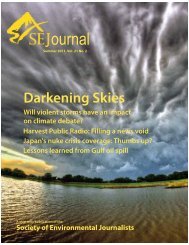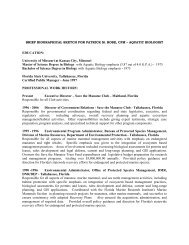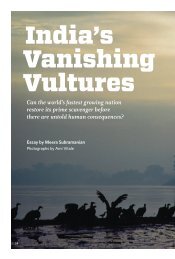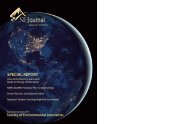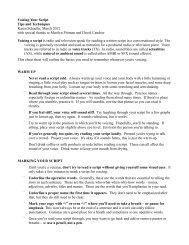PDF Download - Society of Environmental Journalists
PDF Download - Society of Environmental Journalists
PDF Download - Society of Environmental Journalists
Create successful ePaper yourself
Turn your PDF publications into a flip-book with our unique Google optimized e-Paper software.
SEJ Beat<br />
Northwestern University students produce impressive series on<br />
climate change threats to national security<br />
By BILL DAWSON<br />
<strong>Journalists</strong> and news organizations<br />
looking for collaborative ways to<br />
keep alive the tradition <strong>of</strong> in-depth,<br />
public-service reporting have a new<br />
model to consider.<br />
In January, Northwestern University’s<br />
Medill School published “Global<br />
Warning,” an investigative series by<br />
10 <strong>of</strong> its graduate students about the<br />
ways that climate change threatens<br />
national security.<br />
Besides the project’s own website — which also features<br />
interactive elements including a crisis-resolution game — stories<br />
from the series were published in the Washington Post and on<br />
McClatchy Newspapers’ Washington website. They were also<br />
distributed to more than 600 other newspapers by the McClatchy-<br />
Tribune news service.<br />
News outlets around the world published articles from the<br />
series, said Josh Meyer, a former national security writer for the<br />
Los Angeles Times who is now director for education and outreach<br />
for the Medill National Security Journalism Initiative.<br />
“Global Warning,” funded by the McCormick Foundation,<br />
was the first annual reporting project that Medill students will<br />
produce on a subject related to national security.<br />
Meyer told SEJournal that he and Ellen Shearer, director <strong>of</strong><br />
Medill’s Washington program and co-director <strong>of</strong> the initiative,<br />
wanted the initial investigation to address a subject that had<br />
gone largely unexamined by journalists and would represent a<br />
public service.<br />
He said he believes the product <strong>of</strong> the students’ three-month<br />
investigation met both criteria.<br />
In announcing the project’s publication, Medill said that the<br />
team had “found that the nation’s security establishment is not<br />
adequately prepared for many <strong>of</strong> the environmental changes that<br />
are coming faster than predicted and that threaten to reshape<br />
demands made on the military and intelligence community. This is<br />
despite the fact that the Defense Department has called climate<br />
change a potential ‘accelerant <strong>of</strong> instability.’”<br />
The school listed these key findings:<br />
• “The government lacks critical information about where<br />
and when climate changes will happen and what effect<br />
they will have on the U.S. military, intelligence and national<br />
security communities.”<br />
• “In a major strategy review last year, the Pentagon acknowledged<br />
the challenge that climate change poses to its operations, including<br />
a dramatically increased need for intervention in future humanitarian<br />
crises. While military branches have begun global<br />
assessments <strong>of</strong> their vulnerabilities, many security experts say the<br />
work lacks senior level support<br />
in Congress and the administration<br />
and that military service<br />
preparations are not keeping up<br />
with environmental changes.”<br />
• “Work by the CIA and<br />
environmental scientists during<br />
the Clinton administration was<br />
largely ignored in the years <strong>of</strong><br />
George Bush’s presidency.<br />
Although the CIA is now spearheading<br />
intelligence assessments to determine where climate<br />
change could affect global stability, that work may be in jeopardy<br />
as Republicans skeptical <strong>of</strong> climate control take control <strong>of</strong> key<br />
congressional committees.”<br />
• “The nation’s satellite system, which provides the lifeblood <strong>of</strong><br />
climate information, is in disrepair after years <strong>of</strong> inadequate<br />
funding and, in the past two decades, the intelligence community<br />
has struggled both internally and politically to respond to the<br />
challenges posed by climate change.”<br />
• “At home, critical infrastructure along the Gulf <strong>of</strong> Mexico is<br />
vulnerable to the stronger storms and more frequent flooding that<br />
are predicted due to climate change.”<br />
Meyer, a reporter for the Los Angeles Times for 20 years<br />
before joining the Medill faculty, said producing the climate<br />
project was stressful work. “We wanted to make sure we had a<br />
pr<strong>of</strong>essional-grade project for the Post and McClatchy,” he said.<br />
He said he was especially proud that all interviews for the<br />
series were on the record.<br />
Those interviews — more than 200 in all — included the first<br />
that any journalist had conducted with the top CIA <strong>of</strong>ficial at the<br />
agency’s Center on Climate Change and National Security. The<br />
participating students reported from diverse locations including the<br />
Arctic Circle, Bangladesh, Peru, Washington, North Carolina and<br />
Texas. Here are some excerpts from series installments:<br />
“Arctic military posturing heats up” by Jacquelyn Ryan<br />
“While attention has been focused on a pending fight over<br />
Arctic resources military and homeland security <strong>of</strong>ficials say the<br />
real struggle lies in trying to get the resources they need to operate<br />
in an arena that, until now, has sat vacant as a frozen ocean.<br />
“Despite the Arctic being identified as an area <strong>of</strong> key strategic<br />
interest by the White House and Department <strong>of</strong> Defense, the United<br />
States still sits in the far north without the military and civilian<br />
resources it says it needs — and few indications that any significant<br />
ones will be forthcoming.<br />
“Summer 2007 marked a record low <strong>of</strong> Arctic sea ice, and<br />
20 SEJournal Spring 2011<br />
The home page <strong>of</strong> Global-Warming.org<br />
features stories all relating to the impact <strong>of</strong><br />
climate change on national security.<br />
PHOTO COURTESY GLOBAL-WARMING.ORG




